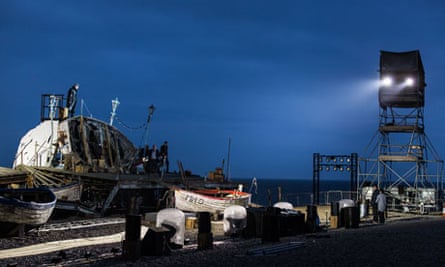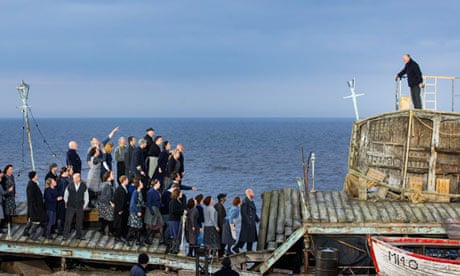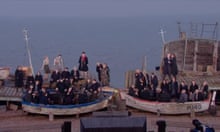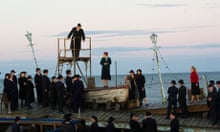Tim Albery is standing on the shingle of Aldeburgh beach, bracing himself against the stiff north-easterly wind sweeping in from the sea. "It's like some terrible theatre exercise," says the director, scarf and cap pulled on tight. "'Class, try and feel what it would really be like to be in Peter Grimes.'" Albery is talking about the production of Benjamin Britten's opera that he's staging on this very shoreline: the ambitious (and potentially foolhardy) highlight of the Aldeburgh festival's celebration of the centenary of their founder's birth.
"At its simplest," says Albery, "we're closer to the world of what the piece is. It's a fascinating lesson in what it's like to live outdoors – which is what these people in the opera all do." But the day I catch rehearsals of Britten's most famous work, arguably the most important British opera ever written, the Suffolk wind is causing havoc with microphones. Tenor Alan Oke, who is singing Grimes for the first time in his career, mounts one of the half-dozen fishing boats that make up the set; the only backdrop is the grey churn of the sea. As he begins his final aria, a gusty moan accompanies him in the speakers.
There will be three performances next week: the recorded sounds of the orchestra and chorus will be played over the beachscape as the principal singers perform live, cued and conducted by Stuart Bedford. "We call it a very sophisticated karaoke," the production manager says. It's a risky one, too: the wind is just one way in which the weather threatens to upstage Grimes on the Beach. Rain would be even worse news for all the microphones, lighting towers, speakers and soundstages that make up the huge set. Oh, and there's the ever-present possibility of a gale.
"The wind is absolutely exhausting," says Albery wearily. Given that they're starting the shows at 8.30pm, there's also the very real chance of temperatures falling beneath what even the thickest of blankets, most potent of tipples and sturdiest of British dispositions can cope with. Then there are the less-than-conventional operatic dangers of freak tides, towering waves, and the set sinking into the spongy shingle, perched just a few feet away from the water.

But so much for defeatism. It's the prospect of everything going fabulously right that is so inspiring about this project. Peter Grimes – which premiered in 1945 at Sadler's Wells in London, with a libretto by Montagu Slater based on an 1810 poem by Aldeburgh-born George Crabbe – isn't just a story about any old misanthropic, violent, misunderstood fisherman, his village and his doomed apprentices. The story itself is set right on Aldeburgh's shingle, in the buildings you can actually see from the stage, and featuring the ancestors of the people who will make up the audience.
Above all, it's about what happens out there on this particular stretch of roiling sea. Northern Irish soprano Giselle Allen sings Ellen Orford, one of Grimes's few friends. "To do this piece here, where Britten wrote it and where it's set, with the Moot Hall down by the beach, is really exciting," she says. The hall is where the opera opens: a tribunal is being held there to determine what happened to Grimes's first apprentice, who died in mysterious circumstances. This 16th-century timber-frame building – where Britten was awarded the freedom of the town in 1962 – is still the centre of Aldeburgh's civic life. It used to be the geographical centre of the town, too, but the sea has steadily eroded the coastline, and it now stands just yards behind the sea defences, a defiant historical relic.

At times, the rehearsal feels like a battle between nature and opera that opera just can't win. I watch as another gust of wind batters the set, sending pages from the conductor's score all over the beach. Oke, however, sees the adverse weather as a good thing. "It's part of Grimes's problem. He spends his entire time struggling with the elements. In the theatre, you have to simulate all that. But here we don't need to – it's all happening for us. That's perfect."
There's an even bigger danger for Grimes on the Beach, though. Britten's music turns nature into one of the opera's most important characters. You hear that most clearly in the Sea Interludes, which reveal the psychology of the characters at key moments by portraying their relationship with the ocean. There's a dazzling Dawn, they battle a Storm, and they're bathed in an uneasy Moonlight. The interludes are some of the most powerful evocations of nature in opera – but they're still, in the end, merely music. Next to the sound and fury of a real storm, how can Britten's score sound like anything other than a lukewarm representation?
Simon Reed, who has lived in Aldeburgh all his life and now runs the lifeboat station, has a few expert thoughts on Britten's rendering of weather. "You get the idea of the noise, certainly," says Reed, who is also playing Dr Crabbe (Slater and Britten's nod to George Crabbe). "But I'm not sure you get the idea of force – when you can't actually move against the wind, especially when there's rain in it, and you go one way and you're hurtled back the other."
For Albery, the gap is precisely the point: nature is a metaphor in Grimes, not the real thing. Of course, he says, Britten's music describes this sea and this sky, "but it's too prescriptive to say he's talking just about these people and this village". He sees the character of Grimes the fisherman as an artist, a visionary. "When Grimes sings, 'I can see the shoals to which the rest are blind,' he's describing the things artists see that we ordinary mortals don't."
There's a visionary quality to this whole production, too. At the end of the day, I watch Oke, framed by the sea and the sky, singing Grimes's final words, in which he longs for a harbour that "shelters peace". Captain Balstrode, played by David Kempster, helps Grimes push his boat out to sea for the last time. "Sink the boat," implores Balstrode. "D'you hear? Sink her." As that little vessel, modelled on the boats that still fish these waters, slips off the set, you feel place, music and story come together with spine-tingling force – even in a windy rehearsal.





Comments (…)
Sign in or create your Guardian account to join the discussion